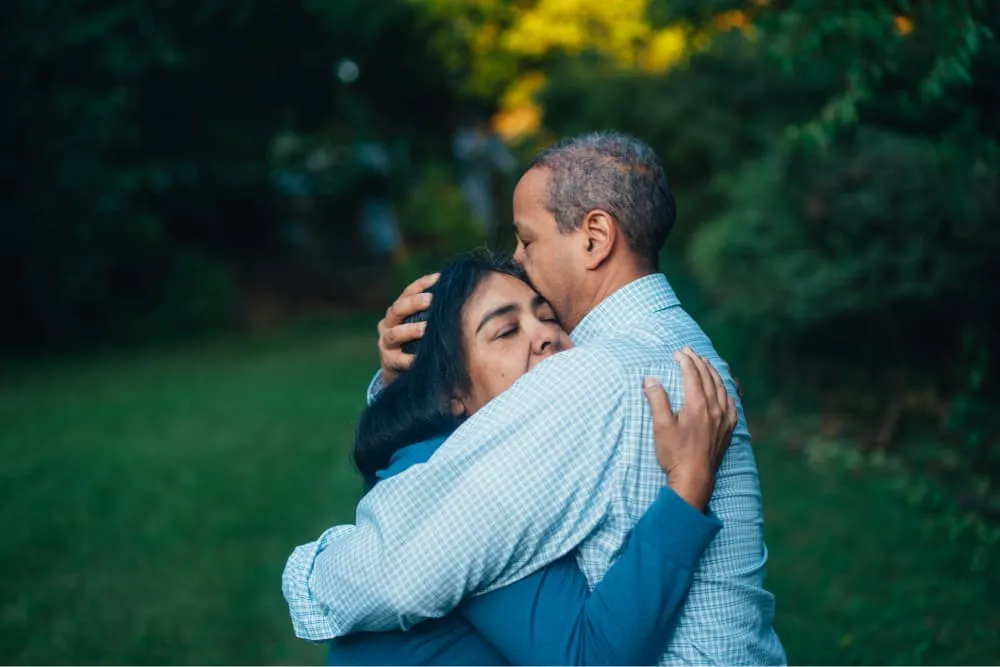We understand how helpless you feel. Seeing your loved one in psychological and physical pain is hard to bear. Know that you’re not alone. Many people find themselves in a similar situation, worried about saying or doing the wrong thing when their friend or family member is so vulnerable.
With a little knowledge and some guidance, you will be able to provide comfort and support to your loved one. Hopefully, this will help them realize they need help and take the first step toward treatment.
Know the warning signs for eating disorders
Your worries about the behaviors of your loved one around food have brought you here. But how do you know for sure their preoccupation with food and their body are indicators of an eating disorder?
It’s certainly not easy. Thanks to the rise of social media, certain eating disorder traits - like lots of physical exercise and cutting out “bad” food groups - resemble behaviors admired by our culture.
This is where a little bit of knowledge about the warning signs of an eating disorder can be very useful, particularly when those living with an eating disorder often can’t recognize the problem in themselves. The common signs and symptoms of an eating disorder include, but aren’t limited to: (1,2)
Behavioral
- Preoccupation with body weight and size
- Obsession with weight loss
- Fixation on diet and the nutritional components of food
- Frequent dieting, skipping meals, and restrictions against certain foods or entire food groups
- Development of food rituals, such as excessive chewing, not allowing foods to touch
- Frequent mirror checking for perceived flaws or avoiding mirrors to prevent seeing their bodies
- Appearing uncomfortable around others and avoiding social situations, particularly those involving food
- Excessive exercise, both in intensity and duration
- Extreme mood swings
- Frequent trips to the bathroom, which indicates a person is engaging in purging behaviors
- Hiding the body in baggy clothing
Physical
- Noticeable fluctuations in weight, both up and down
- Non-specific gastrointestinal complaints, such as stomach cramps, acid reflux, etc.
- Dizziness and fainting
- Menstrual irregularities
- Feeling cold all the time
- Sleep issues
- Dental problems, such as sensitive teeth, cavities, and tooth loss
- Dry skin, and brittle hair and nails
- Fine hair growth all over the body (lanugo)
- Fatigue and muscle weakness
Try these interventions for eating disorders
You’re already doing great, by finding out more about eating disorders to help you understand how your loved one might be feeling. Next is figuring out how and when to approach your friend or relative and what to say. But interventions for eating disorders can be tricky, as people who struggle with eating disorders may not realize or want to acknowledge they have an eating disorder.
Choose your words carefully
We know how hard it can be to raise the subject of an eating disorder. You’re probably worried you’ll say the wrong thing and offend your loved one or cause them to feel blamed when suffering from an eating disorder is not their fault.
Try to stick to “I” statements, followed by concerning behaviors you have seen, such as “I’ve noticed you’re eating all your meals in your room, are you feeling okay?” These “I” statements don’t place blame or shame on an individual. They simply show your concerns in a way that someone in denial about their eating behaviors is more likely to hear.
Other tips to help you talk to your loved ones include:
- Rehearse what you want to say beforehand and write down some thoughts you have to prompt you if needed
- Remember to remind your friend or family member that there is no shame in having an eating disorder and that it’s not their fault
- Be honest about your concerns–your willingness to be open may help encourage your loved one to let their guard down, too
- Avoid over simplistic solutions, such as “please eat”, as eating disorders are such complicated conditions
- Don’t get disheartened if they refuse to talk about it; just let them know you’re there for them whenever they feel ready
Pick the right location
It’s probably best to raise your concerns in a quiet space, where you and your loved one can be alone. Since you know they have problems surrounding food and food behaviors, choose a place where there is no food that might cause a distraction.
Perhaps suggest a walk around your loved one’s favorite park, where you can share your fears in a neutral place at a location where your friend or family member feels safe.
You might be pushed away…at first
Eating disorders thrive on secrecy. Although many of those in recovery agree breaking the silence is the right thing to do, it’s a tough thing to do. At first, your loved one is likely to deny there’s a problem. They may even try to justify their eating behaviors.
You may feel like they are pushing you away deliberately, but this could actually be a symptom of their eating disorder, called anosognosia. This is where a person with an eating disorder can't accurately perceive their condition, as a possible result of malnutrition on the brain.
You can’t make your loved one open up to you, but you can provide consistent support so they know you will provide a non-judgemental ear when they feel ready.
Talk to them about treatment
If your loved one has started to acknowledge they are struggling with disordered thoughts and behaviors surrounding food, you can gently introduce the idea of specialized treatment.
Seeking professional treatment is a monumental step, so make sure you go into this conversation well informed about treatment options and how beneficial they can be. Let them know the sooner they seek treatment the better their chances of a complete recovery.
When a person struggling with an eating disorder doesn’t know what to expect in treatment, it’s easy to imagine the worst. Help ease their fears by offering to attend their initial doctor’s appointment and vow to be there for support throughout their treatment journey.
Encourage social support
One-on-one support is important, but social support is also invaluable, as it’s so easy for those with eating disorders to become isolated and withdrawn. Isolation fuels disordered thoughts and behaviors, so really make an effort to get your loved one involved in social situations and encourage them to continue, even if they refuse. Not only will it help give them respite from their negative thoughts, but it will also help them see they’re valued by others and they’re not alone.
You can help those struggling with an eating disorder with their isolation by:
- Planning social outings that don’t revolve around food or physical activities, such as board game parties or a day at the arcade. These are fun and engaging activities that can help distract from disordered thoughts.
- Being persistent and continuing to invite them to join group activities, even if they usually say no. It shows you won’t give up on them.
- Suggesting a night of hobbies your friend used to enjoy before their eating disorder started to affect their day-to-day lives or trying a new hobby together that you’ve talked about but never got around to.
- Avoiding talking about the eating disorder or treatment when you get together on social occasions, unless your loved one brings it up. Instead, make it all about having fun. This lets them know that you see your friend as more than just their eating disorder.
Final thoughts
Worrying about a loved one having an eating disorder can take its toll on you, too, especially if you don’t feel like you’re getting anywhere. You’ve done what you can by sharing your concerns in the right way and letting them know you’re there for them no matter what.
You can’t force someone to seek help. Only the person living with the eating disorder can take that step. But by giving them something to think about, perhaps they will begin to see that their food thoughts and behaviors are negatively impacting their life.



















































